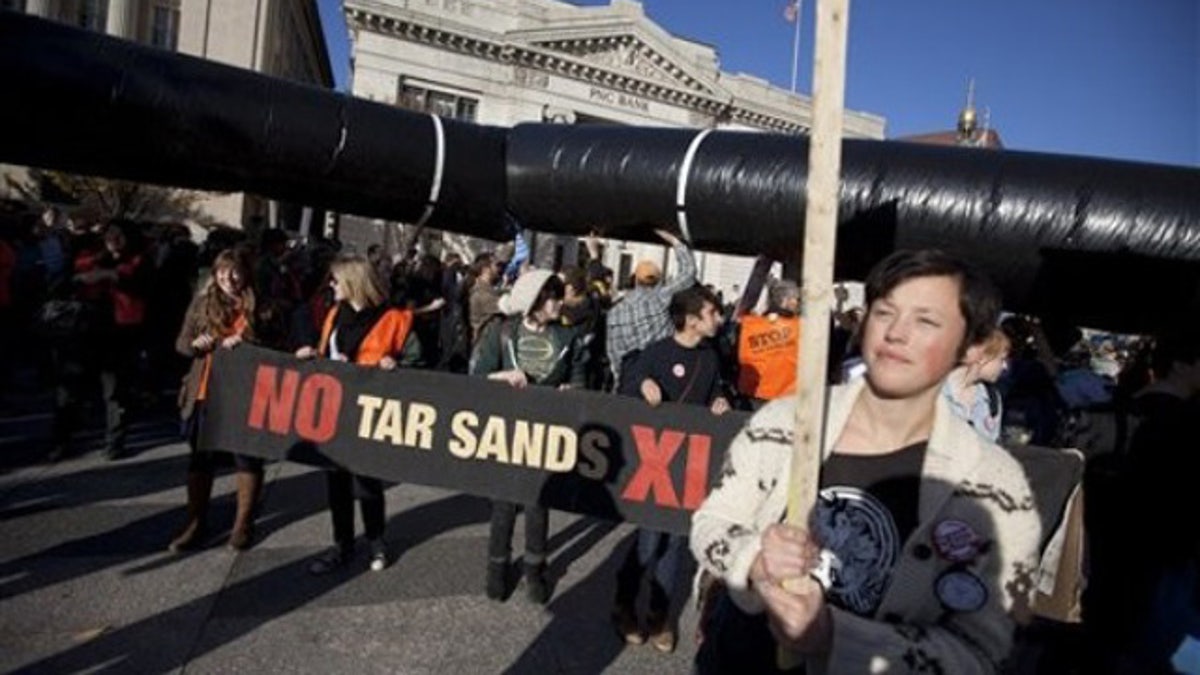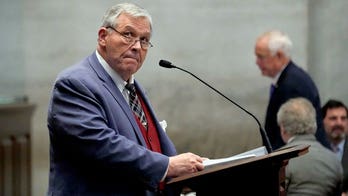
Nov. 6, 2011: Demonstrators march with a replica of a pipeline during a protest to demand a stop to the Keystone XL tar sands oil pipeline in Washington, D.C. (AP)
House Democrats are trying to delay or kill the Keystone pipeline once and for all with a series of poison pill amendments, while Republicans are trying to make sure the pipeline proposal gets to President Obama's desk.
"We are here today because it's time to decide. President Obama and his administration made a decision not to decide," Ed Whitfield, R-Ky., said in debate on the House floor.
"We have waited over 40 months to get approval of this pipeline," he said. "The American people need this pipeline. America needs this additional oil."
And Rep. Lee Terry, R-Neb., said, "keep in mind the president of the United States killed the Keystone pipeline. We think that was kowtowing to the environmental extremists."
With rising gasoline prices and need for jobs both potential campaign issues, Terry is sponsoring a measure that would take the decision away from the president altogether and instruct a federal agency that oversees pipelines to grant the OK, a move the president has threatened to veto.
Democrats have many reasons they oppose the pipeline, though one seems to trump all the others: environmental concerns.
But another key Democratic constituency, labor unions, support the project because of the jobs it would create.
Democrats want to spare Obama the pain of having to choose between them. So they're trying everything to keep Keystone from reaching the president before the election with a series of amendments designed to kill the project.
"What do we get out of the keystone pipeline?" Rep. Ed Markey, D-Mass., asked. "Nothing."
Markey would require that no products refined from Keystone oil could be sold anywhere outside the U.S.
Otherwise, Markey argues, "there is no guarantee that even a drop of the tar sands oil and fuel will stay here in this country."
Republicans, however, say that shows no knowledge of how the market works.
"There's stuff that's left over after the process that we can't even use in the United States that's currently exported today, for decades," Terry said. "We actually don't use all the diesel and we trade with Europe to bring in more gasoline."
And that, he said, would create more American jobs, noting that even many Democrats have already voted against the Markey proposal in committee.
Among several other amendments intended to make the project impossible is one that would require TransCanada to use only steel produced in the U.S. for its pipes.
"I was a little confused when I talked to my friends in the U.S. steel industry and they told me they weren't making any of the steel for this project," Rep. Mike Doyle, D-Pa,., said.
Republicans noted that the company, encouraged by comments from the Obama administration a couple of years ago, has already bought a lot of the materials, not all of which come from the U.S.
Republican Ed Whitfield notes the company plans to spend $7 billion and that "in order to keep costs down, it's already acquired all of the steel and iron that's going to be used in this pipeline."
That makes it impossible for the company to promise to use all American steel, but Whitfield says the company is using American companies and materials for all the preparations.
"Seventy-four percent of the pipe was milled here in North America," he said. But he concedes that if this amendment were adopted, "the permit would not be issued because the applicant cannot certify that 75 percent comes from America because it bought this material a long time ago."
Nevertheless, Republicans note with some satisfaction that the final environmental approval the State Department issued last August made some interesting observations.
"I wish more people would have read the administration's own final environmental impact study," Whitfield said. "It found that not building the Keystone XL pipeline would lead to more oil being transported by riskier means, such as tankers, trains and trucks."
Therefore it concluded, he says, that building the pipeline was environmentally preferable.
For the Republicans, this issue is about jobs and energy, both cutting edge issues in an election year, which is why they want to drop it in the president's lap again -- something Democrats desperately want to avoid.




